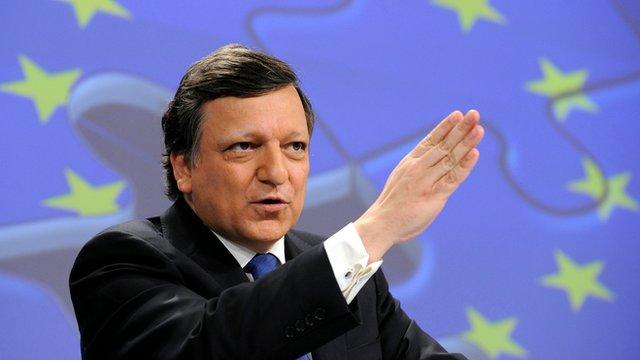EU budget summit opens with hard bargaining
- Published
David Cameron, UK PM: "These are very important negotiations"
European Union leaders have begun talks on the bloc's seven-year budget, with many urging cuts in line with the savings they are making nationally.
The UK said the latest EU proposals were "a step in the right direction" but "did not go far enough" and more must be done to cut spending.
Poland and its ex-communist neighbours want current spending maintained or raised. They rely heavily on EU cash.
The bargaining in Brussels will continue on Friday, or even longer.
France's President Francois Hollande rejected proposals to cut spending on agriculture, saying "the Common Agricultural Policy is not a French policy but a European one". Traditionally France has been a big beneficiary of EU farm support.
UK Prime Minister David Cameron spent about half an hour talking to the President of the European Council, Herman Van Rompuy, and President of the European Commission Jose Manuel Barroso.
A Downing Street statement, external after the meeting said Mr Cameron had stressed the importance of the UK keeping its budget rebate, worth 3.56bn euros (£2.8bn; $1.3bn) in 2011. The statement called the rebate "fully justified". The Commission and some EU governments want the rebate scrapped.
The UK statement said "it was clear that there was a long way to go before we had a deal that reflected the difficult decisions being taken by member states".
Bilateral meetings went on longer than scheduled, delaying the official start of the summit for three hours, until they got under way at about 22:00 GMT.
Contrasting visions
The EU Commission, which drafts EU laws, has called for an increase of 4.8% compared with the 2007-2013 budget.
But the UK and some other net contributors to the budget say cuts have to be made.
Negotiations are focusing on a draft budget - officially called the 2014-2020 Multi-Annual Financial Framework (MFF) - presented by Mr Van Rompuy.
He has made cuts to the Commission's original plan, and proposed a budget of 973bn euros (£782.5bn; $1,245bn).
Countries in central and eastern Europe oppose cuts to cohesion spending - that is, EU money that helps to improve infrastructure in poorer regions.
Agriculture and cohesion are the biggest budget items. The Van Rompuy plan envisages 309.5bn euros for cohesion (32% of total spending) and 364.5bn euros for agriculture (37.5%).
'Quite wrong'
German Chancellor Angela Merkel - who wants to restrain spending - says another summit may be necessary early next year if no deal can be reached in Brussels now.
Thursday's business began with short, individual meetings between national leaders and Mr Van Rompuy and Mr Barroso.
They were then due to assemble for talks as a group in the evening.
Arriving in Brussels, Mr Cameron said: "These are very important negotiations.
"Clearly at a time when we are making difficult decisions at home over public spending it would be quite wrong, it is quite wrong, for there to be proposals for this increased extra spending in the EU."
However, Belgian Prime Minister Elio di Rupo argued the EU needed greater spending, not less.
"We can't have a European Union which demands, which imposes, and a European Union which doesn't have the means to implement its policies," he said.
The BBC's economics editor Stephanie Flanders says the amounts on the table are dwarfed by what governments spend nationally. The very worst that could happen is that the UK's contribution to the EU after 2013 might rise by about £500m a year, she says.
Hurdles
Mr Cameron has warned he may use his veto if other EU countries call for any rise in EU spending. The Netherlands and Sweden back his call for a freeze in spending, allowing for inflation.
Any of the 27 countries can veto a deal, and the European Parliament will also have to vote on the MFF even if a deal is reached.
Failure to agree on the budget would mean rolling over the 2013 budget into 2014 on a month-by-month basis, putting some long-term projects at risk.
If that were to happen it could leave Mr Cameron in a worse position, because the 2013 budget is bigger than the preceding years of the 2007-2013 MFF.
So the UK government could end up with an EU budget higher than what it says it will accept now.
The Commission says the EU budget accounts for less than 2% of public spending EU-wide and that for every euro spent by the EU, the national governments collectively spend 50 euros.
- Published21 November 2012

- Published24 September 2015